Monthly Archives: May 2016
New hearing date for indicted “Codfather” Carlos Rafael, sheriff’s deputy
 The next scheduled court date for indicted fishing magnate Carlos Rafael is a June 22 status conference in Boston, and a trial would have to begin by early September should the case go that far, according to court documents filed this week. The status conference also will include indicted Bristol County Sheriff’s Office deputy Antonio M. Freitas, a 46-year-old Taunton resident. The conference will be held at U.S. District Court in Boston, and signals the transfer of Rafael’s and Freitas’ cases from Magistrate Judge David H. Hennessy to District Court Judge William G. Young. This week’s documents also shed light on when potential trials for Rafael and Freitas could begin. Prosecutors’ indictment of Rafael and Freitas was unsealed May 9, and Freitas appeared in court that day, meaning the Speedy Trial Act would require a trial to begin within 70 days of that initial appearance. Young ruled this week, though, to start the 70-day clock at the June 22 status hearing, rather than May 9. A motion requesting the extension had been agreed upon by prosecutors and defense counsel. Read the rest here 11:26
The next scheduled court date for indicted fishing magnate Carlos Rafael is a June 22 status conference in Boston, and a trial would have to begin by early September should the case go that far, according to court documents filed this week. The status conference also will include indicted Bristol County Sheriff’s Office deputy Antonio M. Freitas, a 46-year-old Taunton resident. The conference will be held at U.S. District Court in Boston, and signals the transfer of Rafael’s and Freitas’ cases from Magistrate Judge David H. Hennessy to District Court Judge William G. Young. This week’s documents also shed light on when potential trials for Rafael and Freitas could begin. Prosecutors’ indictment of Rafael and Freitas was unsealed May 9, and Freitas appeared in court that day, meaning the Speedy Trial Act would require a trial to begin within 70 days of that initial appearance. Young ruled this week, though, to start the 70-day clock at the June 22 status hearing, rather than May 9. A motion requesting the extension had been agreed upon by prosecutors and defense counsel. Read the rest here 11:26
Again we are treated to the absurdity that is “fishery management” in North Carolina
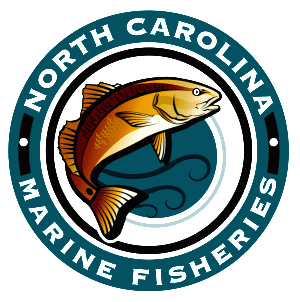 Sam Walker, writing for the outerbanksvoice.com, has what we think is an excellent article on the latest boondoggle from the NC Marine Fisheries Commissison. As with the Southern Flounder, they imposed restriction on cobia without any valid data and against the recommendation of the experts on their staff. Pure special interest politics and kabuki dancing with Federal bureaucrats. Click here to go to the original source to read the story. Commentary – Note that the article reports that the last “stock assessment” (that’s like a census) on cobia was made in 2012. Apparently, the justification for reducing the catch now is that “too many” had been caught recently. The Feds cut the take in Federal waters (three plus miles off shore) and pushed the states to do likewise. Our MFC capitulated but Virginia’s did not. Kudos to Rep. Walter B. Jones, Jr. for blowing the whistle on the Fed fish counters, demanding that a more scientific method of stock assessment must be found. Click here to read the letter Amen to that Walter! Note in the Outer Banks Voice’s article that the approach the NCMFC used was what is called euphemistically as “catch shares.” Think about this. Under the guise that certain species of fish are “overfished” they impose regulations on different kinds of fishermen according to what group you belong to…commercial fishermen, recreational fishermen and even in some instances imposing different regulations (amount that group can catch) on charter boats, while if you fish in the surf different rules apply. Read the rest here 10:34
Sam Walker, writing for the outerbanksvoice.com, has what we think is an excellent article on the latest boondoggle from the NC Marine Fisheries Commissison. As with the Southern Flounder, they imposed restriction on cobia without any valid data and against the recommendation of the experts on their staff. Pure special interest politics and kabuki dancing with Federal bureaucrats. Click here to go to the original source to read the story. Commentary – Note that the article reports that the last “stock assessment” (that’s like a census) on cobia was made in 2012. Apparently, the justification for reducing the catch now is that “too many” had been caught recently. The Feds cut the take in Federal waters (three plus miles off shore) and pushed the states to do likewise. Our MFC capitulated but Virginia’s did not. Kudos to Rep. Walter B. Jones, Jr. for blowing the whistle on the Fed fish counters, demanding that a more scientific method of stock assessment must be found. Click here to read the letter Amen to that Walter! Note in the Outer Banks Voice’s article that the approach the NCMFC used was what is called euphemistically as “catch shares.” Think about this. Under the guise that certain species of fish are “overfished” they impose regulations on different kinds of fishermen according to what group you belong to…commercial fishermen, recreational fishermen and even in some instances imposing different regulations (amount that group can catch) on charter boats, while if you fish in the surf different rules apply. Read the rest here 10:34
Scallop Survey halted – R/V Hugh R. Sharp Losing the HabCam will create uncertainty in the assessment
 Shortly after dawn last Friday, the R/V Hugh R. Sharp was towing a sophisticated array of sensors and cameras along the bottom of the Atlantic Ocean. Then suddenly, the research vessel shuddered. Within seconds, the line went slack, and the team of scientists and volunteers realized the $450,000 camera system was lost, somewhere off the Virginia coast. Officials at the National Oceanic and Atmospheric Administration said they believe the cable connecting to the camera system, known as HabCam, snagged on the remains of the Bow Mariner, a well-known wreck in the area. “This will create uncertainty in the scallop assessment, meaning there’s a greater chance that we’ll catch too few scallops, which will be a short-term loss, or too many, which will be a long-term loss,” said Drew Minkiewicz, an attorney for the Fisheries Survival Fund, a trade group that represents scallopers throughout the Northeast. Read the rest here 10:12
Shortly after dawn last Friday, the R/V Hugh R. Sharp was towing a sophisticated array of sensors and cameras along the bottom of the Atlantic Ocean. Then suddenly, the research vessel shuddered. Within seconds, the line went slack, and the team of scientists and volunteers realized the $450,000 camera system was lost, somewhere off the Virginia coast. Officials at the National Oceanic and Atmospheric Administration said they believe the cable connecting to the camera system, known as HabCam, snagged on the remains of the Bow Mariner, a well-known wreck in the area. “This will create uncertainty in the scallop assessment, meaning there’s a greater chance that we’ll catch too few scallops, which will be a short-term loss, or too many, which will be a long-term loss,” said Drew Minkiewicz, an attorney for the Fisheries Survival Fund, a trade group that represents scallopers throughout the Northeast. Read the rest here 10:12
South Atlantic Council, NOAA science gets ripped! Another crooked closure of red snapper
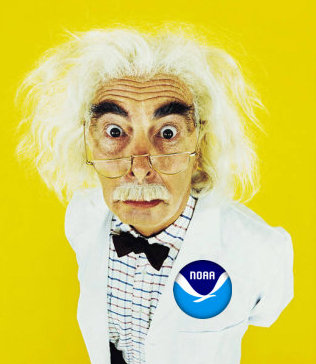 Many of you aren’t fishermen. But even if you don’t know a red snapper from gangsta rapper, this might still be worth a look. The South Atlantic Fisheries Management Council is as crooked and bloated a government bureaucracy as exists today. It perverts science. It feeds on special interests. More importantly, it squanders a natural resource. It announced this week the 2016 season for the American Red Snapper will be closed — as it was in 2015. During the three years prior, the season was open for a total of 12 days. It all began in 2008 when NOAA scientists determined that the red snapper stock in the South Atlantic was at just 3 percent of the biomass 50 years prior. That would have been 1958 when there was neither a NOAA, nor any other group counting red snapper. Perhaps 10 percent of all boats, recreational and commercial, could make the trip out 50 miles where the species thrives. There was no real sonar to find the hundreds of reefs where the fish spawned and no satellite positioning systems to find them again if you did hit a honey hole by accident or luck. So the “science” began as a fabrication, and that continues today. Read the op-ed here 07:45
Many of you aren’t fishermen. But even if you don’t know a red snapper from gangsta rapper, this might still be worth a look. The South Atlantic Fisheries Management Council is as crooked and bloated a government bureaucracy as exists today. It perverts science. It feeds on special interests. More importantly, it squanders a natural resource. It announced this week the 2016 season for the American Red Snapper will be closed — as it was in 2015. During the three years prior, the season was open for a total of 12 days. It all began in 2008 when NOAA scientists determined that the red snapper stock in the South Atlantic was at just 3 percent of the biomass 50 years prior. That would have been 1958 when there was neither a NOAA, nor any other group counting red snapper. Perhaps 10 percent of all boats, recreational and commercial, could make the trip out 50 miles where the species thrives. There was no real sonar to find the hundreds of reefs where the fish spawned and no satellite positioning systems to find them again if you did hit a honey hole by accident or luck. So the “science” began as a fabrication, and that continues today. Read the op-ed here 07:45
Mid Atlantic: National Ocean Policy threatens new regulatory burdens
 Since its creation by Executive Order in 2010, the Obama administration has hailed its National Ocean Policy (NOP) as a non-regulatory, stakeholder-driven initiative that will lead to reduced burdens and less uncertainty for ocean user groups. In reality, it’s nothing of the sort. This was highlighted recently during a hearing held by the U.S. House Natural Resources’ Water, Power and Oceans Subcommittee on the implications of the NOP, where House Natural Resources Committee Chairman Rob Bishop summed up many of the concerns of stakeholders when he noted that “it’s creating more uncertainty, and it certainly is not helping the industry and it’s not helping the environment.” You know what? He’s right. The Long Island Commercial Fishing Association (LICFA) has been closely monitoring the development and implementation of the NOP since its establishment six years ago. We’ve had no other choice, as we represent stakeholders in New York’s $1.4 billion boat-to-table seafood industry, with Long Island in particular landing 99 percent of the state’s wild-caught seafood. Read the rest here 16:42
Since its creation by Executive Order in 2010, the Obama administration has hailed its National Ocean Policy (NOP) as a non-regulatory, stakeholder-driven initiative that will lead to reduced burdens and less uncertainty for ocean user groups. In reality, it’s nothing of the sort. This was highlighted recently during a hearing held by the U.S. House Natural Resources’ Water, Power and Oceans Subcommittee on the implications of the NOP, where House Natural Resources Committee Chairman Rob Bishop summed up many of the concerns of stakeholders when he noted that “it’s creating more uncertainty, and it certainly is not helping the industry and it’s not helping the environment.” You know what? He’s right. The Long Island Commercial Fishing Association (LICFA) has been closely monitoring the development and implementation of the NOP since its establishment six years ago. We’ve had no other choice, as we represent stakeholders in New York’s $1.4 billion boat-to-table seafood industry, with Long Island in particular landing 99 percent of the state’s wild-caught seafood. Read the rest here 16:42
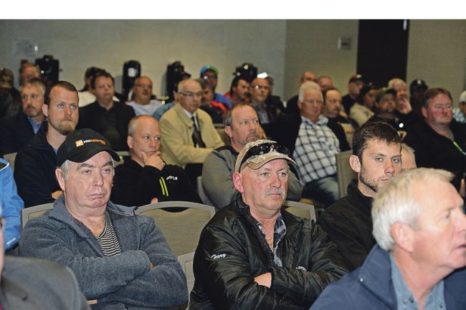
Abandon LIFO: Fishermen ask for new deal on shrimp
Glen Winslow and the six-member crew of the Roberts Sisters II should have been fishing for crab Tuesday. Instead, the boat was tied up in St. John’s harbor. Winslow joined more than 150 other people, mostly fishermen, in trying to convince a federal review panel to recommend the federal government abandon the last in, first out (LIFO) approach on allocating northern shrimp quotas. The majority of those in the room asked the minister not continue to force smaller, inshore enterprises to take the greater share of quota cuts on the declining stock off Newfoundland and Labrador, when compared to larger, “offshore” enterprises. “We’ll be out of the (shrimp) fishery this year,”,, Read the story here 15:01
Athearn Marine Agency Boat of the Week: 42′ Bruno & Stillman lobster boat, 8-V-71 Detroit Diesel
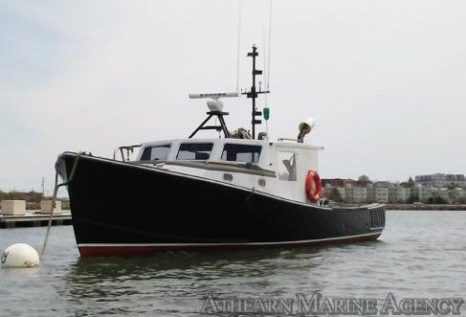 To see specifications, information and 15 photos Click here. To see all the boats in this series, Click here 12:28
To see specifications, information and 15 photos Click here. To see all the boats in this series, Click here 12:28
Rhode Island tagged Bluefin Tuna gains 593 pounds, travels 3,865 miles before recapture in the Mediterranean
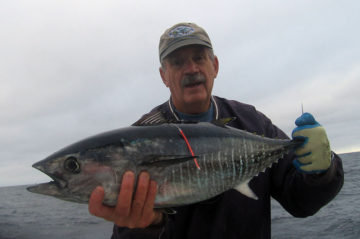 The National Oceanographic and Atmospheric Administration’s (NOAA) Southeast Fisheries Science Center in Miami, Florida has been tagging fish for years with the help of fishermen and scientists throughout the world. A 9-pound bluefin tuna caught, tagged and released by Capt. Al Anderson of Narragansett in 2004 at the Mudhole (about 17 miles east/southeast of Pt. Judith) was recaptured recently in the Mediterranean Sea off the coast of Sardinia, weighing in at 602 pounds. Anderson, who has tagged more bluefin tuna than anyone else in the world, said, “This was the 13th bluefin tuna I caught, tagged and released. The tagging of fish caught by fishermen helps scientists determine their migratory pattern, define their populations and if possible, estimate their growth rates, population sizes and mortality rate.” Tagging programs also help scientists determine the need for conservation programs, as well as how to plan for conservation programs. “During the 11-year timeframe from point of tagging to point of recapture, this bluefin tuna traveled 3,865 miles,” said Anderson. Read the rest here 11:54
The National Oceanographic and Atmospheric Administration’s (NOAA) Southeast Fisheries Science Center in Miami, Florida has been tagging fish for years with the help of fishermen and scientists throughout the world. A 9-pound bluefin tuna caught, tagged and released by Capt. Al Anderson of Narragansett in 2004 at the Mudhole (about 17 miles east/southeast of Pt. Judith) was recaptured recently in the Mediterranean Sea off the coast of Sardinia, weighing in at 602 pounds. Anderson, who has tagged more bluefin tuna than anyone else in the world, said, “This was the 13th bluefin tuna I caught, tagged and released. The tagging of fish caught by fishermen helps scientists determine their migratory pattern, define their populations and if possible, estimate their growth rates, population sizes and mortality rate.” Tagging programs also help scientists determine the need for conservation programs, as well as how to plan for conservation programs. “During the 11-year timeframe from point of tagging to point of recapture, this bluefin tuna traveled 3,865 miles,” said Anderson. Read the rest here 11:54
Freedom, danger is in R.I. fisherman’s wheelhouse – Mark Patinkin
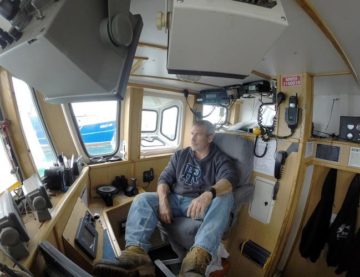 I got to wondering what it’s like these days for commercial fishermen so I drove to the Point Judith docks, walked up to the trawler Elizabeth & Katherine and asked the captain, Steven Arnold, if I could come aboard. It was at 11 a.m. and he’d already put in a long shift with plenty more to go — he’d steamed out for squid at 4:30 a.m. He was back because his net tore on rocks while dragging the bottom of Rhode Island Sound so the crew had come in to repair it. I climbed over the rail and followed Arnold, 52, to the wheelhouse. He wore jeans, boots, a sweatshirt, hadn’t shaved for a few days and seemed to belong there in the captain’s seat. Squid is his biggest species but that morning, they weren’t there. He mostly had scup when the net came up torn. You have good days and bad, Arnold said, but he still loves fishing for the same reasons that first drew him to it after a childhood in South County and two years at New England Tech. Read the story here 11:01
I got to wondering what it’s like these days for commercial fishermen so I drove to the Point Judith docks, walked up to the trawler Elizabeth & Katherine and asked the captain, Steven Arnold, if I could come aboard. It was at 11 a.m. and he’d already put in a long shift with plenty more to go — he’d steamed out for squid at 4:30 a.m. He was back because his net tore on rocks while dragging the bottom of Rhode Island Sound so the crew had come in to repair it. I climbed over the rail and followed Arnold, 52, to the wheelhouse. He wore jeans, boots, a sweatshirt, hadn’t shaved for a few days and seemed to belong there in the captain’s seat. Squid is his biggest species but that morning, they weren’t there. He mostly had scup when the net came up torn. You have good days and bad, Arnold said, but he still loves fishing for the same reasons that first drew him to it after a childhood in South County and two years at New England Tech. Read the story here 11:01
In Maine’s last open lobster zone, a feud over limiting newcomers
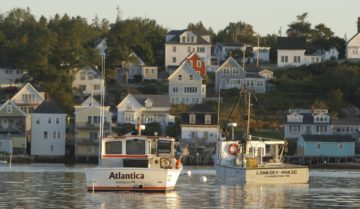 In most of Maine, adults who want to make their living trapping lobster must wait until a licensed lobsterman dies or forgets to file a license renewal. There is only one place in the state, in the waters of eastern Penobscot Bay off Stonington, Vinalhaven and Isle au Haut, where a resident who completes the necessary training and safety classes can get a license to lobster without waiting for at least a decade. But the lobstermen who oversee Maine’s last open lobster territory are now fighting over whether to cap the number of lobstermen who can fish those waters, effectively closing the last open door to the state’s largest commercial fishery. The debate is pitting islanders who worry that a cap would eliminate an incentive for adult children to return home against mainland fishermen who want to protect this lucrative industry from outside exploitation. After years of debate, the local lobster council has tried to put the issue to a vote twice before, but the meetings have fallen through, with members missing meetings or walking out moments before a closure vote could be held. Read the story here 09:33
In most of Maine, adults who want to make their living trapping lobster must wait until a licensed lobsterman dies or forgets to file a license renewal. There is only one place in the state, in the waters of eastern Penobscot Bay off Stonington, Vinalhaven and Isle au Haut, where a resident who completes the necessary training and safety classes can get a license to lobster without waiting for at least a decade. But the lobstermen who oversee Maine’s last open lobster territory are now fighting over whether to cap the number of lobstermen who can fish those waters, effectively closing the last open door to the state’s largest commercial fishery. The debate is pitting islanders who worry that a cap would eliminate an incentive for adult children to return home against mainland fishermen who want to protect this lucrative industry from outside exploitation. After years of debate, the local lobster council has tried to put the issue to a vote twice before, but the meetings have fallen through, with members missing meetings or walking out moments before a closure vote could be held. Read the story here 09:33
“Joint Law Enforcement Agreement” – Constrain Feds and Encourage Science for Fishermen
 Progressive protection of the fisheries is needed but mostly against polluters and out-of-state special interests controlling NC legislators. Federal agencies are necessary to stop the destruction of fisheries by foreign and out-of-state special interests that defy the people’s will in NC. Federalism is not inherently bad and is needed for doing things (together, as a nation) that concern issues that cross State borders, like pollution and some fish stocks fall into that category, as well. Having said that, there are large, distinctly NC fisheries, that should not fall into Federal Management, like crabbing and any commercial fishing within the Sounds, inside the Barrier Islands, unique to NC. Read the rest here 08:40
Progressive protection of the fisheries is needed but mostly against polluters and out-of-state special interests controlling NC legislators. Federal agencies are necessary to stop the destruction of fisheries by foreign and out-of-state special interests that defy the people’s will in NC. Federalism is not inherently bad and is needed for doing things (together, as a nation) that concern issues that cross State borders, like pollution and some fish stocks fall into that category, as well. Having said that, there are large, distinctly NC fisheries, that should not fall into Federal Management, like crabbing and any commercial fishing within the Sounds, inside the Barrier Islands, unique to NC. Read the rest here 08:40
How safe is the fishing industry in South Jersey? Training and tech improve safety
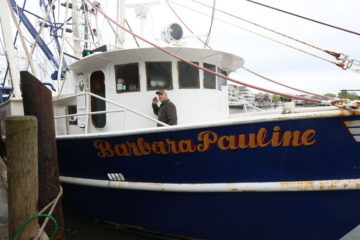 The crew of the Barbara-Pauline offloaded 17,000 pounds of scallops, stored like jewelry in soft cloth bags. And for the Port of Cape May, they might as well be white gold. New Jersey’s fisheries were ranked 11th in total value nationwide at $152 million in 2014. The Port of Cape May, with its valuable scallop fishery, is responsible for much of that. The Barbara Pauline made its quota in eight days at sea, earning each crew member as much as $15,000. But it’s not easy money. Commercial fishing is one of America’s most dangerous jobs. Statistically, fishermen are far more likely to die on the job than those in virtually any other profession. In the decade of the 2000s, an average of 17 fishermen died at sea each year from sinking, capsizing, falls overboard or traumatic injuries sustained on pitching decks surrounded by heavy moving equipment. Read the story here 08:00
The crew of the Barbara-Pauline offloaded 17,000 pounds of scallops, stored like jewelry in soft cloth bags. And for the Port of Cape May, they might as well be white gold. New Jersey’s fisheries were ranked 11th in total value nationwide at $152 million in 2014. The Port of Cape May, with its valuable scallop fishery, is responsible for much of that. The Barbara Pauline made its quota in eight days at sea, earning each crew member as much as $15,000. But it’s not easy money. Commercial fishing is one of America’s most dangerous jobs. Statistically, fishermen are far more likely to die on the job than those in virtually any other profession. In the decade of the 2000s, an average of 17 fishermen died at sea each year from sinking, capsizing, falls overboard or traumatic injuries sustained on pitching decks surrounded by heavy moving equipment. Read the story here 08:00
Bay of Fundy Fishermen raise cash for tidal power injunction
 Fishermen are building a legal war chest to launch a court fight against tidal power projects being tested this year in the Bay of Fundy. Chris Hudson, president of the Bay of Fundy Inshore Fisherman’s Association, says the rapid deployment of the test turbines is forcing the fishermen’s hands. At least two turbines are expected to be deployed in June. Hudson and a number of other sources confirmed the association is talking to legal counsel about an injunction to temporarily block the turbines from being deployed. “It’s not that we’re against it, but they shouldn’t be allowed to just jump over everybody,” Hudson said in an interview with the Chronicle Herald Tuesday. “They haven’t consulted with us and don’t have the proper studies in place,” he said. Hudson, who also started a petition last week, brought more than 60 of the highest-earning Bay of Fundy fishermen to the Digby fire hall Sunday night to discuss what to do. Multiple sources said members of the FORCE tidal power group also attended the meeting, but Hudson said the meeting was was to consult with fishermen. Read the rest here 20:44
Fishermen are building a legal war chest to launch a court fight against tidal power projects being tested this year in the Bay of Fundy. Chris Hudson, president of the Bay of Fundy Inshore Fisherman’s Association, says the rapid deployment of the test turbines is forcing the fishermen’s hands. At least two turbines are expected to be deployed in June. Hudson and a number of other sources confirmed the association is talking to legal counsel about an injunction to temporarily block the turbines from being deployed. “It’s not that we’re against it, but they shouldn’t be allowed to just jump over everybody,” Hudson said in an interview with the Chronicle Herald Tuesday. “They haven’t consulted with us and don’t have the proper studies in place,” he said. Hudson, who also started a petition last week, brought more than 60 of the highest-earning Bay of Fundy fishermen to the Digby fire hall Sunday night to discuss what to do. Multiple sources said members of the FORCE tidal power group also attended the meeting, but Hudson said the meeting was was to consult with fishermen. Read the rest here 20:44
‘Fraught With Defects’, Connecticut Lawmakers Urge Reforms To Fishing Regulations
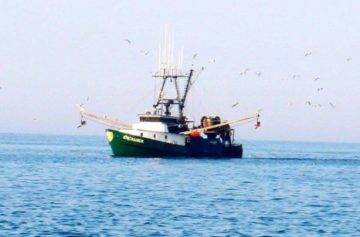 Connecticut’s congressional delegation is leading a renewed push for reform of federal commercial fishing quotas critics say are out of date, wasteful, fail to respond to climate change and unfair to New England fishermen. Warming ocean temperatures are pushing vast numbers of fish like black bass, summer flounder and scup farther north into New England waters, according to the delegation’s letter to federal officials, but old fishing quotas severely restrict how many of those fish commercial boats from this region are allowed to keep. The out-of-date quota system means that fishermen from North Carolina, Virginia and Maryland are allowed to take much larger numbers of those types of fish, even when they come to New England’s offshore waters to net them, according to a joint letter by Connecticut and Massachusetts members of Congress. Read the rest here 20:15
Connecticut’s congressional delegation is leading a renewed push for reform of federal commercial fishing quotas critics say are out of date, wasteful, fail to respond to climate change and unfair to New England fishermen. Warming ocean temperatures are pushing vast numbers of fish like black bass, summer flounder and scup farther north into New England waters, according to the delegation’s letter to federal officials, but old fishing quotas severely restrict how many of those fish commercial boats from this region are allowed to keep. The out-of-date quota system means that fishermen from North Carolina, Virginia and Maryland are allowed to take much larger numbers of those types of fish, even when they come to New England’s offshore waters to net them, according to a joint letter by Connecticut and Massachusetts members of Congress. Read the rest here 20:15
Louisiana: Shrimp season’s start isn’t a happy one – Low prices and fewer shrimp
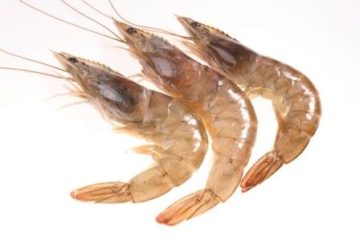 Shrimp season opened Monday. Observers say fishermen are caught between small catches and low prices. There are two shrimping seasons, spring and fall. Spring is considered the brown shrimp season, which opened Monday. “The season opened today, and the catch is way off from what it usually is,” commercial fisherman Rodney Olander said. “The grade is way smaller than what we usually open with and, as usual, the price is down on us.” Olander has worked as a commercial fisherman for 37 years. He docks his boat at Cypremort Point State Park and shrimps in Vermillion and Cote Blanche bays. That area usually produces more white shrimp than brown. “We’ve been sitting idle for the last six months, waiting for the season to open,” Olander said. “The season opens — there is not a lot of shrimp. The shrimp are small. And they plan on cutting the prices on us.” Read the story here 18:32
Shrimp season opened Monday. Observers say fishermen are caught between small catches and low prices. There are two shrimping seasons, spring and fall. Spring is considered the brown shrimp season, which opened Monday. “The season opened today, and the catch is way off from what it usually is,” commercial fisherman Rodney Olander said. “The grade is way smaller than what we usually open with and, as usual, the price is down on us.” Olander has worked as a commercial fisherman for 37 years. He docks his boat at Cypremort Point State Park and shrimps in Vermillion and Cote Blanche bays. That area usually produces more white shrimp than brown. “We’ve been sitting idle for the last six months, waiting for the season to open,” Olander said. “The season opens — there is not a lot of shrimp. The shrimp are small. And they plan on cutting the prices on us.” Read the story here 18:32
NEFSC, R/V Hugh R. Sharp Lose HabCam during Scallop survey, Fisheries Survival Fund takes them to task!
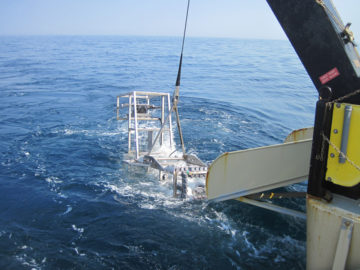 Last Thursday, May 19, 2016, while on the current scallop survey, the NEFSC crew lost the HabCam when it separated from the vessel. According to initial reports, it was inadvertently driven into the side of a known and charted shipwreck while being operated by a volunteer, losing at least a week of valuable sea time. Several knowledgeable sources have suggested that there could be as much as $100,000 in damage. Accordingly, the researchers must return to port to acquire a remote operated vehicle, which they will use to attempt to find the lost HabCam. The loss of a key piece of scallop survey equipment demonstrates the need for an overhaul of how the federal government assesses the species. The Fisheries Survival Fund (FSF), which represents the majority of the limited access scallop fleet, calls for reforms to how scallop surveys are conducted to prevent such an incident from derailing surveys in the future. Read the rest here 17:25
Last Thursday, May 19, 2016, while on the current scallop survey, the NEFSC crew lost the HabCam when it separated from the vessel. According to initial reports, it was inadvertently driven into the side of a known and charted shipwreck while being operated by a volunteer, losing at least a week of valuable sea time. Several knowledgeable sources have suggested that there could be as much as $100,000 in damage. Accordingly, the researchers must return to port to acquire a remote operated vehicle, which they will use to attempt to find the lost HabCam. The loss of a key piece of scallop survey equipment demonstrates the need for an overhaul of how the federal government assesses the species. The Fisheries Survival Fund (FSF), which represents the majority of the limited access scallop fleet, calls for reforms to how scallop surveys are conducted to prevent such an incident from derailing surveys in the future. Read the rest here 17:25
Tonight on the “Deadliest Catch” – Big Wave Bends the Northwestern’s Bow
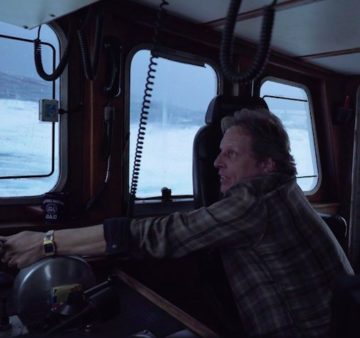 Opi season begins on tonight’s episode of Deadliest Catch which means Sig Hansen is back in the Northwestern’s wheelhouse. While he avoided the last storm, when brother Edgar was at the helm for Bairdi, the weather doesn’t let up. When a captain as seasoned as Sig says, “Whoa…” at the sight of a wave, you know it’s a big one. Our exclusive sneak peek shows a 35-foot rogue wave slamming into the boat, causing Sig to duck in the wheelhouse and, as Edgar later notices, buckling the steel of the bow like a tin can. “Gotta pay attention,” Sig says. “Gotta pay attention,” Watch the trailer, read the rest here 15:00
Opi season begins on tonight’s episode of Deadliest Catch which means Sig Hansen is back in the Northwestern’s wheelhouse. While he avoided the last storm, when brother Edgar was at the helm for Bairdi, the weather doesn’t let up. When a captain as seasoned as Sig says, “Whoa…” at the sight of a wave, you know it’s a big one. Our exclusive sneak peek shows a 35-foot rogue wave slamming into the boat, causing Sig to duck in the wheelhouse and, as Edgar later notices, buckling the steel of the bow like a tin can. “Gotta pay attention,” Sig says. “Gotta pay attention,” Watch the trailer, read the rest here 15:00
The Fishermen’s Mission and its 130-year lifeline to Scotland’s coastal communities
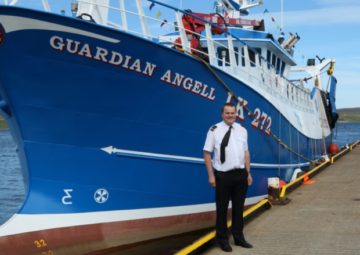 FOR the communities which draw their livelihood from Scotland’s forbidding seas, the Fishermen’s Mission has been a steadying anchor for more than 130 years. And with tragedy and danger continuing to blight the fishing industry, the Fishermen’s Mission believes its work is as relevant now as it was in the late 1800s when the first staff set sail to deliver food, compassion and the gospel to Scotland’s fishing crews. The reach of its work is today as broad as it is deep, with the charity helping not only the men at sea but the families of those employed in what the mission describes as the ‘most dangerous peacetime occupation’. Read the story here 13:32
FOR the communities which draw their livelihood from Scotland’s forbidding seas, the Fishermen’s Mission has been a steadying anchor for more than 130 years. And with tragedy and danger continuing to blight the fishing industry, the Fishermen’s Mission believes its work is as relevant now as it was in the late 1800s when the first staff set sail to deliver food, compassion and the gospel to Scotland’s fishing crews. The reach of its work is today as broad as it is deep, with the charity helping not only the men at sea but the families of those employed in what the mission describes as the ‘most dangerous peacetime occupation’. Read the story here 13:32
Regardless of legally caught sharks, California’s ban on possession and sale of shark fins stands
 California’s ban on the possession and sale of shark fins survived a legal challenge Monday when the U.S. Supreme Court rejected an appeal by Bay Area suppliers and sellers of shark fin soup, a traditional dish in the Chinese American community. “The purpose of the (California) shark fin law is to conserve state resources, prevent animal cruelty, and protect wildlife and public health,” the Ninth U.S. Circuit Court of Appeals in San Francisco said in a 2-1 ruling. The court said opponents of the state law had acknowledged that it still allows the use of about 95 percent of any legally caught shark for meat, skin and oils. The Obama administration at first supported opponents of the state law, filing arguments in 2013 that disputed California’s authority to restrict the sale of sharks that had been legally caught in federal waters. But it later changed its position after discussions with state fish and wildlife officials and said the two laws could be harmonized, with federal rules governing shark fishing while California regulated commerce within the state. Read the rest here 12:29
California’s ban on the possession and sale of shark fins survived a legal challenge Monday when the U.S. Supreme Court rejected an appeal by Bay Area suppliers and sellers of shark fin soup, a traditional dish in the Chinese American community. “The purpose of the (California) shark fin law is to conserve state resources, prevent animal cruelty, and protect wildlife and public health,” the Ninth U.S. Circuit Court of Appeals in San Francisco said in a 2-1 ruling. The court said opponents of the state law had acknowledged that it still allows the use of about 95 percent of any legally caught shark for meat, skin and oils. The Obama administration at first supported opponents of the state law, filing arguments in 2013 that disputed California’s authority to restrict the sale of sharks that had been legally caught in federal waters. But it later changed its position after discussions with state fish and wildlife officials and said the two laws could be harmonized, with federal rules governing shark fishing while California regulated commerce within the state. Read the rest here 12:29
Fishermen, Scientists Collaborate to Collect Climate Data
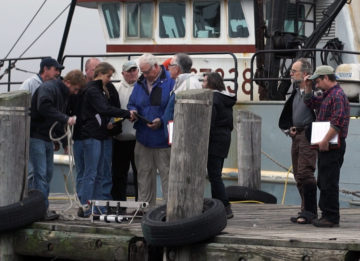 Fishermen plying the waters off the southern New England coast have noticed significant changes in recent years. Though generations of commercial fishermen have made their livings on these highly productive waters, now, they say, they are experiencing the impacts of climate change. “The water is warming up, and we see different species around than we used to,” says Kevin Jones, captain of the F/V Heather Lynn, which operates out of Point Judith, Rhode Island. To help understand the ongoing changes in their slice of the ocean, Jones and other fishermen in the region are now part of a fleet gathering much-needed climate data for scientists through a partnership with the Commercial Fisheries Research Foundation (CFRF) and Woods Hole Oceanographic Institution (WHOI). Video Read the rest here 10:02
Fishermen plying the waters off the southern New England coast have noticed significant changes in recent years. Though generations of commercial fishermen have made their livings on these highly productive waters, now, they say, they are experiencing the impacts of climate change. “The water is warming up, and we see different species around than we used to,” says Kevin Jones, captain of the F/V Heather Lynn, which operates out of Point Judith, Rhode Island. To help understand the ongoing changes in their slice of the ocean, Jones and other fishermen in the region are now part of a fleet gathering much-needed climate data for scientists through a partnership with the Commercial Fisheries Research Foundation (CFRF) and Woods Hole Oceanographic Institution (WHOI). Video Read the rest here 10:02
Pelagic red crabs return to Monterey, bad sign for fishermen
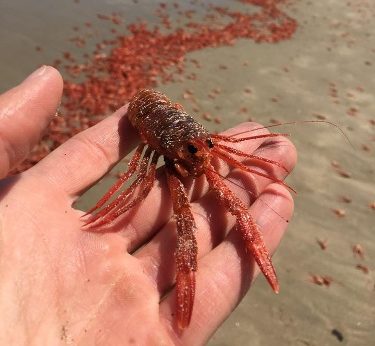 Monday, millions of pelagic red crabs washed ashore on Del Monte Beach in Monterey. A rare sight for beach goers but bad news for fisherman. “When I was a tuna fisherman we used to see them down south, and down south near the equator, down there that’s a good sign to catch tuna, but up here seeing them it’s not such a good sign,” said Gaspar Catanzaro with the Monterey Fish Company. These crabs like warm water and this past El Niño has kept the Monterey Bay warmer than usual. These conditions are preventing nutrient filled water to mix up to the surface And as a result the commercial squid season has been a bust since it opened in April. According to Catanzaro, his 6 boats have had a tough time catching any squid locally. Read the rest here 09:39
Monday, millions of pelagic red crabs washed ashore on Del Monte Beach in Monterey. A rare sight for beach goers but bad news for fisherman. “When I was a tuna fisherman we used to see them down south, and down south near the equator, down there that’s a good sign to catch tuna, but up here seeing them it’s not such a good sign,” said Gaspar Catanzaro with the Monterey Fish Company. These crabs like warm water and this past El Niño has kept the Monterey Bay warmer than usual. These conditions are preventing nutrient filled water to mix up to the surface And as a result the commercial squid season has been a bust since it opened in April. According to Catanzaro, his 6 boats have had a tough time catching any squid locally. Read the rest here 09:39
Oceana wants the feds to require 2,400 skimmer trawls to use TED’s, increase observer coverage
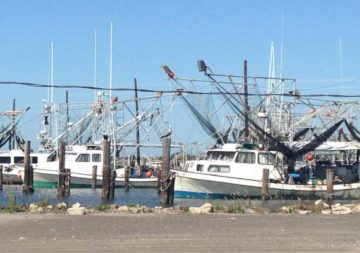 Skimmer trawls have been exempt from the requirement to use the devices while other nets on larger boats have been forced to comply since the 1980s, according to Tuesday’s Oceana report, “TEDs for All Trawls: A Net Positive for Fishermen and Sea Turtle.” The report calls on the federal government to require that all shrimp trawls use a smaller-spaced TED, require that trawls using the current TED to transition to a smaller spaced one, and to increase the number of federal observers for the shrimp industry. Currently, the TEDs have a 4-inch space between the bars, and Oceana would like to see shrimpers move to a 3-inch gap. Read the rest here 08:32
Skimmer trawls have been exempt from the requirement to use the devices while other nets on larger boats have been forced to comply since the 1980s, according to Tuesday’s Oceana report, “TEDs for All Trawls: A Net Positive for Fishermen and Sea Turtle.” The report calls on the federal government to require that all shrimp trawls use a smaller-spaced TED, require that trawls using the current TED to transition to a smaller spaced one, and to increase the number of federal observers for the shrimp industry. Currently, the TEDs have a 4-inch space between the bars, and Oceana would like to see shrimpers move to a 3-inch gap. Read the rest here 08:32
Getting CHOKED! Cod quota cuts, boats not fishing could interrupt New Bedford fish auction trading
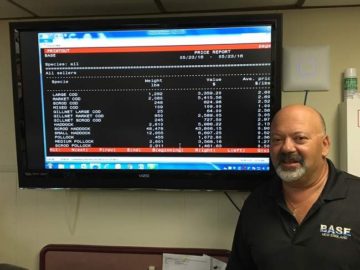 The fish auction that’s been a daily institution on the city’s waterfront for decades could see periodic closures over the next month or so, as a co-owner said Monday that this year’s significant cut to the cod quota is keeping many boats tied to the docks, rather than bringing in fish. Richard Canastra, co-owner of the Whaling City Seafood Display Auction since 1994, said Monday morning that in his view, “there won’t be” fish auctions on some days between now and July 4, when he expects commercial fishing activity to pick up again. “There’s not many fishermen fishing anymore,” Canastra said as he stood outside the auction building on Hassey Street. “A lot of the boats are just tied up — they’re not going to fish. Why would they fish if there’s only so much (allowable) cod?” Former New Bedford Mayor John Bullard, now regional administrator for NOAA fisheries, has said the new regulations create “about a 95 percent cut” since 2012 in catch limits for Georges Bank cod, a key species for New Bedford’s fishing industry. Read the rest here 06:43
The fish auction that’s been a daily institution on the city’s waterfront for decades could see periodic closures over the next month or so, as a co-owner said Monday that this year’s significant cut to the cod quota is keeping many boats tied to the docks, rather than bringing in fish. Richard Canastra, co-owner of the Whaling City Seafood Display Auction since 1994, said Monday morning that in his view, “there won’t be” fish auctions on some days between now and July 4, when he expects commercial fishing activity to pick up again. “There’s not many fishermen fishing anymore,” Canastra said as he stood outside the auction building on Hassey Street. “A lot of the boats are just tied up — they’re not going to fish. Why would they fish if there’s only so much (allowable) cod?” Former New Bedford Mayor John Bullard, now regional administrator for NOAA fisheries, has said the new regulations create “about a 95 percent cut” since 2012 in catch limits for Georges Bank cod, a key species for New Bedford’s fishing industry. Read the rest here 06:43
Fishing town blasts EU for foreign boats fishing in British waters then selling fish back to the residents.
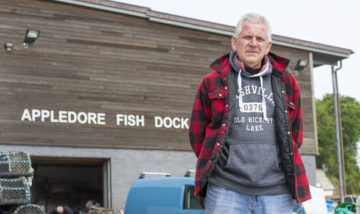 Appledore, a town in north-west Devon, has claimed there are no British boats left in the harbour, blaming EU fishing quotas. It is a sharp decline from “about 80 to 100 boats” in 2002, says Tony Rutherford, chief executive of North Devon Fisherman’s Association. The Hannah Marie marked the end of an era of British ships sailing the costal waters, after she was sold five weeks ago bound for Denmark. Mr Rutherford, owner of Bideford Fisheries which since 1979 has bought fish from fishermen to sell to wholesalers claims most of the boats are now Belgium. Read the rest here 16:00
Appledore, a town in north-west Devon, has claimed there are no British boats left in the harbour, blaming EU fishing quotas. It is a sharp decline from “about 80 to 100 boats” in 2002, says Tony Rutherford, chief executive of North Devon Fisherman’s Association. The Hannah Marie marked the end of an era of British ships sailing the costal waters, after she was sold five weeks ago bound for Denmark. Mr Rutherford, owner of Bideford Fisheries which since 1979 has bought fish from fishermen to sell to wholesalers claims most of the boats are now Belgium. Read the rest here 16:00
Operation Black Glass – Spain to Asia network of Chinese elver smugglers busted
 EVERY operation undertaken by the Guardia Civil is given a special name and when the Nature arm, Seprona, started an investigation into the illegal export of Angulas (elvers or juvenile eels) it was inventively name Black Glass. Commencing in October 2015, officers became aware that large volumes of these elvers were being illegally obtained by Chinese traders, and smuggled out of Spain to Asia using false documents. Over a period of time and with the active assistance of Europol, various addresses near to the Madrid Barajas Airport were kept under surveillance and raids in various parts of the country netted 700 kilos of illegal elvers with an estimated value of €1 million. Having identified those responsible, 20 people, mainly of Chinese nationality, but including three Spaniards were arrested and the operation has been dismantled, although a further nine suspects are being hunted. Read the rest here 13:54
EVERY operation undertaken by the Guardia Civil is given a special name and when the Nature arm, Seprona, started an investigation into the illegal export of Angulas (elvers or juvenile eels) it was inventively name Black Glass. Commencing in October 2015, officers became aware that large volumes of these elvers were being illegally obtained by Chinese traders, and smuggled out of Spain to Asia using false documents. Over a period of time and with the active assistance of Europol, various addresses near to the Madrid Barajas Airport were kept under surveillance and raids in various parts of the country netted 700 kilos of illegal elvers with an estimated value of €1 million. Having identified those responsible, 20 people, mainly of Chinese nationality, but including three Spaniards were arrested and the operation has been dismantled, although a further nine suspects are being hunted. Read the rest here 13:54
‘Aquatic cocaine’: Fish bladders are latest Mexican smuggling commodity
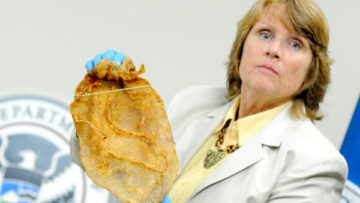 One hundred twenty-one fish swim bladders lay before Garcia Pereda on the concrete floor, most of them white, some with shades of pink. The smell of fish guts was overwhelming, a stench Garcia Pereda never grew accustomed to, even as he went from bust after bust of the illegal smuggling. This was a huge haul of “aquatic cocaine”: 39 kilos of totoaba fish swim bladders, with a Hong Kong street value of $750,000. Not quite as big as a recent bust, thought Garcia Pereda, where they’d stopped 600 bladders from getting across the U.S.-Mexico border, flowing eventually to China. The fishermen – Jorge Garcia sat on the back of his truck, selling fish filets and shrimp to tourists wandering the boardwalk in San Felipe. He looked out at the water, disgusted that his two boats are not doing what Garcia was raised to do: fish big game like totoaba. “We’re being punished,” he said. “Young fishermen from out of town are coming in, fishing illegally in the water, making tons of money.” Read the story here 11:04
One hundred twenty-one fish swim bladders lay before Garcia Pereda on the concrete floor, most of them white, some with shades of pink. The smell of fish guts was overwhelming, a stench Garcia Pereda never grew accustomed to, even as he went from bust after bust of the illegal smuggling. This was a huge haul of “aquatic cocaine”: 39 kilos of totoaba fish swim bladders, with a Hong Kong street value of $750,000. Not quite as big as a recent bust, thought Garcia Pereda, where they’d stopped 600 bladders from getting across the U.S.-Mexico border, flowing eventually to China. The fishermen – Jorge Garcia sat on the back of his truck, selling fish filets and shrimp to tourists wandering the boardwalk in San Felipe. He looked out at the water, disgusted that his two boats are not doing what Garcia was raised to do: fish big game like totoaba. “We’re being punished,” he said. “Young fishermen from out of town are coming in, fishing illegally in the water, making tons of money.” Read the story here 11:04
Will North Carolina give up even more sovereignty to the National Marine Fisheries Service?
 Next week (June 1) will be a significant day if you are concerned about Federal control of our lives. There will be a meeting of an “advisory group” in New Bern to consider whether or not the state should sign a “Joint Law Enforcement Agreement” to impose greater Federal control over the regulation of fishing within the state’s waters. Note the last part…within the state’s waters. Click here to read the announcement. Most people, even including fishermen, will not be in New Bern on June 1. The decision of whether to recommend to give this power to the National Marine Fisheries Service will be made by a small group of people who serve on this panel representing various special interest groups who have a stake in fishing regulations. As always, the dominant special interests are recreational fishing interests vs. commercial fishing interests. Read the rest here 10:03
Next week (June 1) will be a significant day if you are concerned about Federal control of our lives. There will be a meeting of an “advisory group” in New Bern to consider whether or not the state should sign a “Joint Law Enforcement Agreement” to impose greater Federal control over the regulation of fishing within the state’s waters. Note the last part…within the state’s waters. Click here to read the announcement. Most people, even including fishermen, will not be in New Bern on June 1. The decision of whether to recommend to give this power to the National Marine Fisheries Service will be made by a small group of people who serve on this panel representing various special interest groups who have a stake in fishing regulations. As always, the dominant special interests are recreational fishing interests vs. commercial fishing interests. Read the rest here 10:03






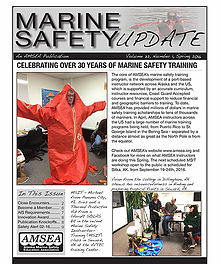
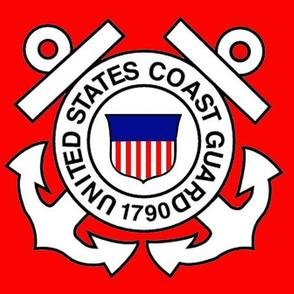



























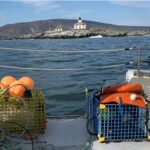



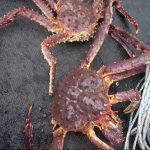
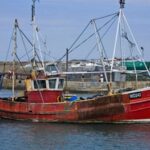
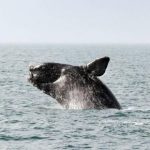
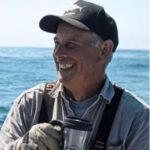
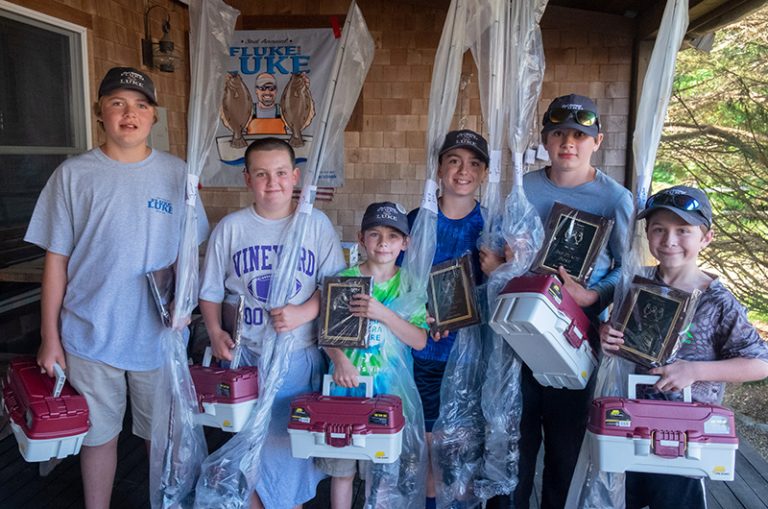



Northeast Regional Planning Body (RPB) releases draft Northeast Regional Ocean Plan
Share this post